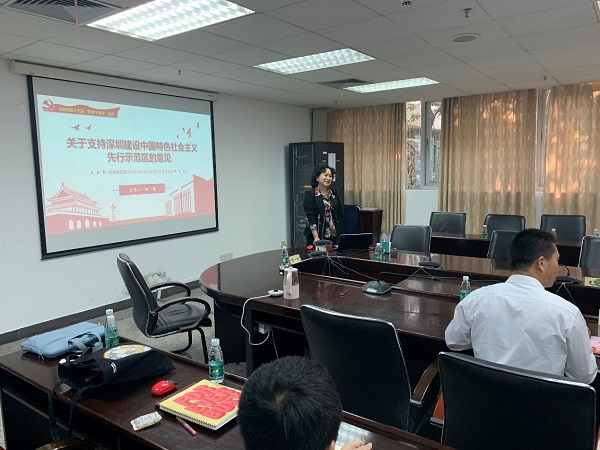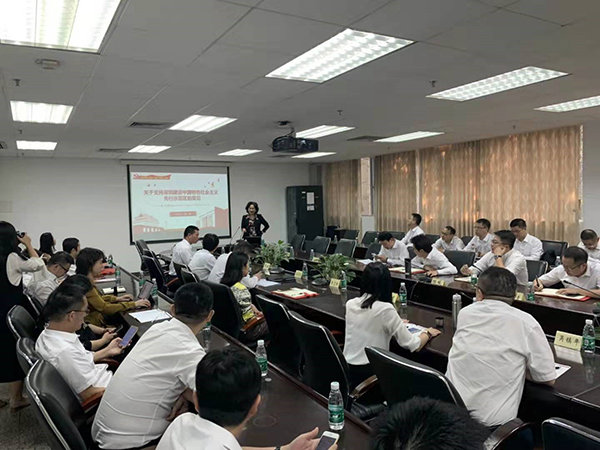On November 6, 2019, at the invitation of the Marketing & Sales Committee, Shenzhen Airlines, Prof. Tao Yitao delivered a training course under the “Courses for Grassroots Leaders” Program. Prof. Tao is director of the China Center for Special Economic Zone Research (CCSEZR), Shenzhen University, the president of the Belt and Road Research Institute of Shenzhen University and also president of the Belt and Road Research Institute (Shenzhen) for International Cooperation and Development (BRRI). On the training course, she gave a thematic report titled Theoretical and Practical Significance of Building into a Pioneering Demonstration Area of Socialism with Chinese Characteristics. Attending were members of CPC committee and management staff of the Marketing & Sales Committee Shenzhen, and members of the general management team of Shenzhen Airlines.
A scene of the training
Prof. Tao addressed relevant concepts in the Opinions of the CPC Central Committee and the State Council on Supporting Shenzhen to Build a Pioneering Demonstration Zone of Socialism with Chinese Characteristics (the “Opinions”) in a profound, yet simple way. She shed new light on the Opinions from the following aspects: 1) Overall framework and analysis of the "Opinions"; 2) Why history has once again chosen Shenzhen; 3) "Special Economic Zone" and "China’s Path"; 4) Pilot demonstration area and the Guangdong-Hong Kong-Macao Greater Bay Area; 5) Institutional constraints on pilot demonstration.
Prof. Tao pointed out that the Opinions, as a strategic deployment of the CPC Central Committee to deepen reforms and a great mission given in the new era to China's most successful SEZ, stand as a recognition of Shenzhen's role, function and mission in China’s 40 years of reform and opening-up and ardent expectations for Shenzhen, a young city known for taking the lead in reform and opening-up. The Opinions also mark the epoch-making beginning of another great practice of China’s Path. This innovative practice of reform deepening would surely provide more convincing theoretical support and a practice model for the institutional changes and modernization of China, and offer a Chinese solution to challenges of emerging market economies while proving the correctness of China's Path.
Prof. Tao stated that the internal logic behind taking the lead in building a modern economy that reflects high-quality development is that: innovation serves as the engine of economic growth, modern industrial system acts as the foundation, comprehensively deepening reform and opening-up provides the institutional impetus, and bolstering the construction of the Guangdong-Hong Kong-Macao Greater Bay Area (the Greater Bay Area) is an important function and also the goal to give play to the role of the Greater Bay Area as a regional engine.

Prof. Tao Yitao in the lecture
Prof. Tao Yitao believed that to take the lead in building a modern economic system that reflects high-quality development, Shenzhen should focus on deepening reforms and institutional innovation in the following four aspects.
1. Renew ideas and achieve the self-reform of government with more conviction, courage and wisdom, so as to ensure that Shenzhen truly continues to lead the country in deepening reform.
2. Ensure total factor productivity, especially the free flow of high-tech talented people without institutional barriers, with a more open institutional arrangement. As stated in the Opinions, "...support Shenzhen to implement a more open and convenient overseas talent introduction and entry-exit management system, and allow international talented people who have obtained permanent residency to found technology-based enterprises in Shenzhen and act as legal representatives of scientific research institutions.
She emphasized that the free flow of human capital without institutional barriers is an institutional prerequisite for optimal resource allocation and regional integration.
3. Create an industrial environment for the modern economic system that reflects high-quality development, with a more international perspective. As suggested in the Opinions, "we will carry out pilot reforms on market access and regulator system, and establish a more flexible, prudent and inclusive regulatory system"; "study and improve the GEM issuance, listing, refinancing, merger, acquisitions and restructuring system, and create conditions for promoting the reform of the registration system"; "take the lead in advancing the internationalization of the renminbi, and explore innovative cross-border financial regulation" and so on.
4. Capitalize on Hong Kong elements, draw from the institutional advantages of Hong Kong's mature market economy, make full use of Hong Kong's position as the world's third largest financial center, leverage the research capacity and strength of Hong Kong's established universities and research platforms that already enjoy some reputation in the world, accelerate the establishment of a modern economic system that reflects the requirements for high-quality development against the backdrop of deepened collaboration between Shenzhen and Hong Kong, achieve common development and share prosperity and affluence among people of two regions.
The 90-minute course passed quickly before everyone realized it. Prof. Tao Yitao's report shed new light for everyone. Many attendees said that this report was of great significance and helped them better understand the Opinions thanks to Prof. Tao’s unique interpretation.
The course came to an end amid thunders of applause.

